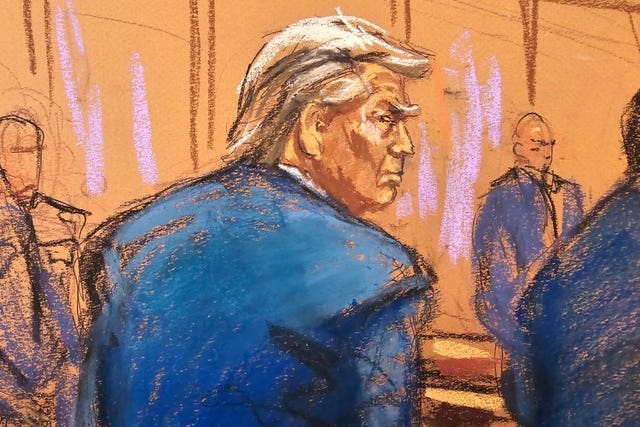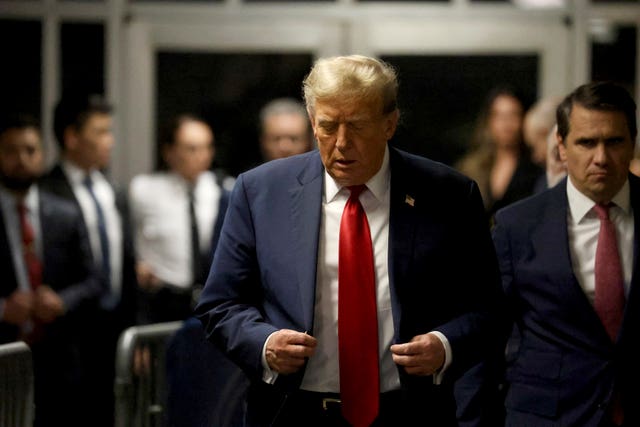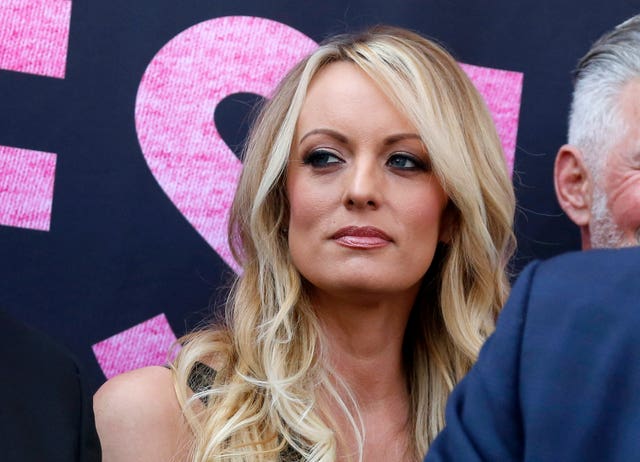First day of Trump hush-money trial ends without any jurors being picked
Ninety-six jurors were brought into the courtroom.

The historic hush-money trial of Donald Trump got under way on Monday with the process of selecting a jury to hear the case charging the former president with falsifying business records in order to stifle stories about his sex life.
The day ended without any jurors being seated. The selection process was scheduled to resume again on Tuesday.
The first criminal trial of any former US commander in chief will unfold as Trump vies to reclaim the White House, creating a remarkable split-screen spectacle of the presumptive Republican nominee spending his days as a criminal defendant while also campaigning for the presidency.
“It’s a scam. It’s a political witch hunt. It continues, and it continues forever,” Trump said after exiting the courtroom, where he sat at the defence table with his lawyers.
After a norm-shattering presidency shadowed by years of investigations, the trial amounts to a historic courtroom reckoning for Trump, who now faces four indictments charging him with crimes ranging from hoarding classified documents to plotting to overturn an election.
Yet the political stakes are less clear since a conviction would not preclude him from becoming president and because the allegations in this case date back years and are seen as less grievous than the conduct behind the three other indictments.
The day began with hours of pretrial arguments, including over a potential fine for Trump, before moving into the start of jury selection Monday afternoon.
Ninety-six jurors were brought into the courtroom. Trump craned his neck to look back at the pool of people who could decide his fate, whispering to his lawyer as they entered the jury box.

“The name of this case is the People of the State of New York vs Donald Trump.”
Trump’s notoriety would make the process of picking 12 jurors and six alternates a near-herculean task in any year, but it is likely to be especially challenging now, unfolding in a closely contested presidential election in the city where Trump grew up and catapulted to celebrity status before winning the White House.
Judge Merchan has written that the key is “whether the prospective juror can assure us that they will set aside any personal feelings or biases and render a decision that is based on the evidence and the law”.
No matter the outcome, Trump is determined to benefit from the proceedings, casting the case, and his indictments elsewhere, as a broad “weaponisation of law enforcement” by Democratic prosecutors and officials.
He maintains they are orchestrating sham charges in hopes of impeding his presidential run.
He has lambasted judges and prosecutors for years, a pattern of attacks that continued up to the moment he entered court on Monday, when he said: “This is political persecution. This is a persecution like never before.”

He also said prosecutors could not play for the jury the 2005 Access Hollywood recording in which Trump was captured discussing grabbing women sexually without their permission.
However, prosecutors will be allowed to question witnesses about the recording, which became public in the final weeks of the 2016 campaign.
Prosecutors also asked for Judge Merchan to fine Trump 3,000 dollars over social media posts that they said violated the judge’s gag order barring him from attacking witnesses.
Last week, he used his Truth Social platform to call his former lawyer Michael Cohen and the adult film actor Stormy Daniels “two sleaze bags who have, with their lies and misrepresentations, cost our Country dearly.”
“The defendant has demonstrated his willingness to flout the order. He’s attacked witnesses in the case,” said Christopher Conroy, one of the trial prosecutors.
One of Trump’s lawyers, Todd Blanche, maintained that Trump was simply responding to the witnesses’ statements.
“It’s not as if President Trump is going out and targeting individuals. He is responding to salacious, repeated vehement attacks by these witnesses,” Mr Blanche said.

The charges centre on 130,000 dollars in payments that Trump’s company made to Mr Cohen. He had paid that sum on Trump’s behalf to keep Daniels from going public, a month before the election, with her claims of a sexual encounter with the married mogul a decade earlier.
Prosecutors say the payments to Mr Cohen were falsely logged as legal fees in order to cloak their actual purpose. Trump’s lawyers say the disbursements indeed were legal expenses, not a cover-up.
After decades of fielding and initiating lawsuits, the businessman-turned-politician now faces a trial that could result in up to four years in prison if he is convicted, though a no-jail sentence also would be possible. Trump would also be expected to appeal against any conviction.
Trump’s attorneys lost a bid to get the hush-money case dismissed and have since repeatedly sought to delay it, prompting a flurry of last-minute appeals court hearings last week.
Among other things, Trump’s lawyers maintain that the jury pool in overwhelmingly Democratic Manhattan has been tainted by negative publicity about Trump and that the case should be moved elsewhere.
An appeals judge turned down an emergency request to delay the trial while the change-of-venue request goes to a group of appellate judges, who are set to consider it in the coming weeks.
Manhattan prosecutors have countered that a lot of the publicity stems from Trump’s own comments and that questioning will tease out whether prospective jurors can put aside any preconceptions they may have.
There is no reason, prosecutors said, to think that 12 fair and impartial people cannot be found amid Manhattan’s roughly 1.4 million adult residents.





